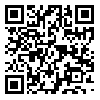BibTeX | RIS | EndNote | Medlars | ProCite | Reference Manager | RefWorks
Send citation to:
URL: http://mjiri.iums.ac.ir/article-1-330-en.html
Abstract
Background: This study sought to determine patient characteristics, process of care, and outcome as predictors of reintubation after open-heart surgery.
Methods: We performed a retrospective case control study that included all patients undergoing cardiac surgery who required reintubation and an equal number of control patients not requiring reintubation. Putative risk factors were analyzed univariately by Moses, Kroskal Willis and χ2 tests.
Results: Of the 300 consecutive patients reviewed, 39 required reintubation for cardio- respiratory reasons. Univariate predictors of reintubation (P= 0.05) were preoperative CO2, ejection fraction, weight, diabetes, and intra-operative fluid balances. Multivariate predictors of reintubation for each group (with cardio-respiratory reasons) and for all patients were determined and included preoperative PaCO2, type of operation, ejection fraction (EF), pre- operative PaO2, number of grafts, age, intra-aortic balloon pump, pump time, clamp time, pH at extubation time, and PaO2 at extubation time.
Conclusion: Patients who required reintubation had the worst respiratory function. Patients identified as having high risk factors for reintubation should be followed closely and treated for problems that will lead to reintubation.
| Rights and permissions | |
 |
This work is licensed under a Creative Commons Attribution-NonCommercial 4.0 International License. |





